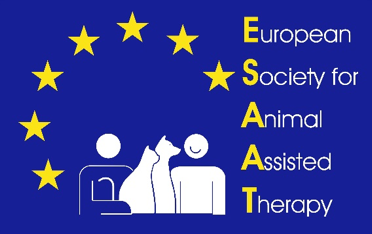
certified specialist diploma course
Objective
The task of the “specialist for animal-assisted therapy” is to support people in their need for relief of their complaints, autonomy and personal and social integration through the use of an animal or a therapy accompanying team in their basic professional field or under professional competent involvement.
The aim of this diploma course is the qualification as a certified specialist for the professional use of animals in the support of people of all ages. In particular, people with an increased need for support (e.g. in hospitals, geriatric centres, educational institutions, rehabilitation centres, etc.) in the sense of health promotion, preventive and rehabilitative measures. There is the possibility to train your own dog as a TAT therapy assistance dog in order to be professionally active as a TAT therapy assistance dog team. In addition, as a TAT therapy companion dog team, a specialization for various areas such as pedagogy, geriatrics, social services or psychotherapeutic assignments can be completed.
Structure and duration
The course takes place on 16 weekends (approx. 1x per month), each on Saturday and Sunday (approx. 8:30-17:00). In addition to the regular course weekends, an exam and presentation date will be held. For the degree, in addition to attendance at the course weekends, various sub-areas, such as a scientific term paper and 160 hours of practical training (to be organised independently) must be completed (see: Curriculum). If the course is attended with the own dog, additional courses have to be attended and examinations (theory and practice) have to be passed.
Place/Maintenance
Courses are delivered through webinars and live online lectures. Individual courses are taught at various training sites such as the University of Veterinary Medicine or on field trips.
Closing
After positive completion of the diploma course, participants receive a certificate as a certified specialist for animal-assisted therapy and animal-assisted support measures. If the training with one’s own dog to become a TAT therapy assistance dog team was completed within the scope of the course, one additionally receives the certificate of eligibility “TAT driving licence therapy assistance dog team”.
During the lecture weekends (Saturday and Sunday) the events will take place daily from about 8.30 am to 5 pm.
Cost:
4 semesters (16 course weekends/approx. 8:30 – 17:00)
DLG without dog = 1500 hours (60 ECTs)/ 5.400€
DLG with dog = 1600 hours (65 ECTs)/ 6.100€
Contact :
Animals as Therapy- Science and Education Centre – Centre for Human-Animal Encounter
Silenegasse 2, Stiege 3, A 1220 Vienna
Tel.: (01) 890 64 07
Mobile: 0699 120 17 888
https://www.tierealstherapie.at
Follow us also on Facebook, Instagram and Youtube

Information about the association “TAT” SOWIE “TAT – WAZ”.
Further trainings and courses of TAT and TAT-WAZ
- THERAPY COMPANION DOG TRAINING
- ANIMAL TRAINER TRAINING
- DOG PRO -CHILDREN WORKSHOP
- INDIVIDUAL TRAINING SESSIONS
- VARIOUS FURTHER TRAINING COURSES FOR ANIMAL-ASSISTED WORK
- THERAPY COMPANION DOG TRAINING
- ONLINE- ANIMAL-ASSISTED APPLICATIONS IN EDUCATION / SCHOOL
- ONLINE FIRST AID FOR DOGS ZOONOSES – HYGIENE
- ONLINE ANIMAL ASSISTED INTERVENTIONS WITH PEOPLE WITH DISABILITIES
- ONLINE ANIMAL-ASSISTED INTERVENTIONS IN GERIATRICS AND PSYCHOLOGY
- ONLINE- ANIMAL-ASSISTED APPLICATIONS IN PEDAGOGY / KINDERGARTEN
Animal assisted therapy – this also means a great responsibility for those who engage in this important activity. Therefore, TAT cooperates with renowned human and veterinary physicians as well as practitioners from all relevant fields in order to ensure the necessary quality in training and application.
So it was natural that TAT for the first time established quality criteria for the suitability and training of therapy support animals. Once again, TAT was a pioneer – out of a sense of responsibility and in the interests of all the teams deployed and all the people cared for.
Often, however, the various terms such as service dog, working dog, therapy dog, etc. simply cause confusion. We have therefore provided an explanation of the most important terms in our definitions.
Hygiene is very important when working in animal-assisted therapy or animal-assisted support measures. Of course, our therapy teams pay attention to the necessary hygiene and the health of their animals in the field.



